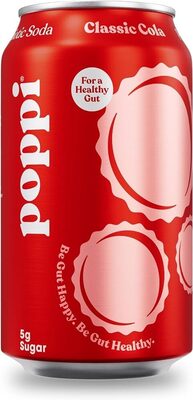Additives
-
Used as an acidity regulator and flavor enhancer. Can be irritating to skin, eyes, and mucous membranes at high doses.
Not Restricted
-
Propellant used in food for fermentation, preservation, and carbonation. It is non-toxic and occurs naturally.
Not Restricted
-
Natürlicher Süßstoff aus Stevia-Pflanze, bis zu 300-mal süßer als Zucker
Not Restricted
Questionable Ingredients
-
Refined white sugar is associated with health risks such as weight gain, type 2 diabetes, heart disease, and tooth decay. The World Health Organization (WHO) recommends limiting daily sugar intake to less than 10% of total daily calorie intake, which corresponds to about 25 grams of sugar (6 teaspoons) for a physically active adult. A further reduction to 5% (3 teaspoons or 15 grams) may offer additional health benefits. High sugar consumption can lead to overweight, type 2 diabetes, heart disease, and tooth decay. It is advisable to reduce the consumption of added sugars and focus on a balanced diet with natural, unprocessed foods.
-
Natural flavors are derived from plant, animal, or microbial sources, including microorganisms, molds, or even pig bristles.
-
Caffeine is a stimulant that increases alertness and reduces fatigue. However, high caffeine intake can lead to insomnia, nervousness, rapid heartbeat, and high blood pressure. It may pose risks for pregnant or breastfeeding women and individuals with cardiovascular conditions. Moderate consumption and attention to individual tolerance are recommended.
Additives
-
Used as an acidity regulator and flavor enhancer. Can be irritating to skin, eyes, and mucous membranes at high doses.
Not Restricted
-
Propellant used in food for fermentation, preservation, and carbonation. It is non-toxic and occurs naturally.
Not Restricted
-
Natürlicher Süßstoff aus Stevia-Pflanze, bis zu 300-mal süßer als Zucker
Not Restricted
Questionable Ingredients
-
Sugar
Refined white sugar is associated with health risks such as weight gain, type 2 diabetes, heart disease, and tooth decay. The World Health Organization (WHO) recommends limiting daily sugar intake to less than 10% of total daily calorie intake, which corresponds to about 25 grams of sugar (6 teaspoons) for a physically active adult. A further reduction to 5% (3 teaspoons or 15 grams) may offer additional health benefits. High sugar consumption can lead to overweight, type 2 diabetes, heart disease, and tooth decay. It is advisable to reduce the consumption of added sugars and focus on a balanced diet with natural, unprocessed foods.
-
Natural Flavors
Natural flavors are derived from plant, animal, or microbial sources, including microorganisms, molds, or even pig bristles.
-
Caffeine
Caffeine is a stimulant that increases alertness and reduces fatigue. However, high caffeine intake can lead to insomnia, nervousness, rapid heartbeat, and high blood pressure. It may pose risks for pregnant or breastfeeding women and individuals with cardiovascular conditions. Moderate consumption and attention to individual tolerance are recommended.








